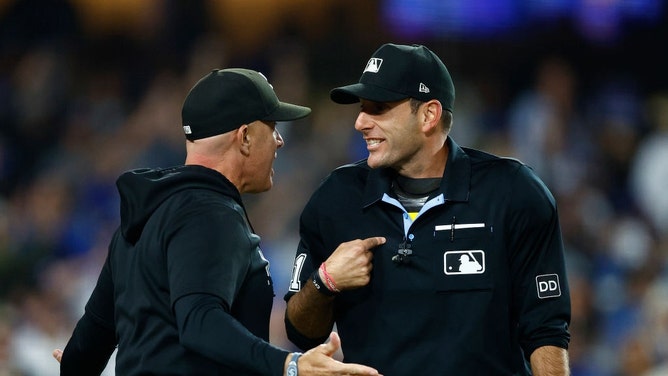Rob Manfred Officially Wants To Bring Robo Ump System To MLB Next Year
Robo umps are coming fast
Major League Baseball commissioner Rob Manfred is set to officially propose introducing the automated ball-strike system to on-field competition in regular-season games starting in 2026.
Manfred told reporters on Wednesday that the league wants the system to start next year, after a trial run during spring training before the 2025 season. And Manfred usually gets what he wants.
The league office has a majority of the 11-person competition committee, though player representatives and a single umpire are also involved. With control over the majority vote, Manfred could simply push through the ABS system regardless of what other parties want. Though he has maintained that the players and teams are in favor of incorporating the challenge system.
"I do think that we’re going to pursue the possibility of changing that process, and we’ll see what comes out at the end of that," Manfred said. "I think that teams are really positive about ABS. You know, I do have that unscientific system that I use — my email traffic — and my distinct impression is that using ABS in spring training has made people more prone to complain about balls and strike calls via email, to me, referencing the need for ABS. That is undoubtedly true, undoubtedly true."

Chicago White Sox manager Pedro Grifol argues a call with MLB home plate umpire Pat Hoberg in the sixth inning vs. the Los Angeles Dodgers at Dodger Stadium. (Ronald Martinez/Getty Images)
MLB Umpires Have Plenty Of Tough Days Ahead
Though approval seems all but a formality, the MLB Player's Association seemed a bit less convinced that the robo umps are a foregone conclusion.
"As they have in the past, players will review any proposed rule changes and provide their feedback and on-field experiences through the competition committee," said Kevin Slowey, managing director of player services, in a statement.
The ABS system generally received favorable reviews in spring training, allowing pitchers, catchers, and hitters to challenge what seemed like obvious missed calls. Manfred said Wednesday he wants to ensure that players are happy with how the system plays out.
"My single biggest concern is working through the process and deploying it in a way that’s acceptable to the players," Manfred said. "There’s always going to be things around the edges that we need to work through and whatever, and I want them to feel like we respected the committee process and that there was a full airing of concerns about the system, and an attempt to address those concerns before we go forward."
Many of Manfred's initiatives have faced a wave of criticism of players, though to his credit, have mostly come to be viewed as positive changes. Pace of play is significantly improved, thanks to the pitch clock and game times have dropped dramatically.
Even the extra innings ghost runner, while still a bit bizarre, has shortened games. The challenge system for balls and strikes could be similarly transformative. It remains to be seen though, if it lengthens game times, or negatively impacts the on-field product with fans and players forced to wait through reviews after celebrating a big strikeout or game-changing walk.
Guess we'll find out soon enough.